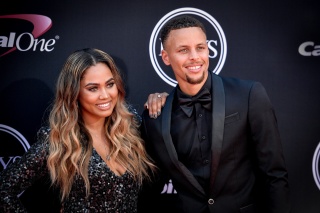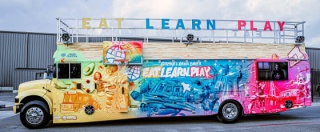Curtis Bunn
NBC News | NBCBLK
“It's not the teacher’s fault. It’s not the parents’ fault. It's a community issue,” said Ayesha Curry, whose new bus unites kids with healthy food and books.
(Black PR Wire) The bus is loud — in color and sound. That’s the way NBA star Stephen Curry and his entrepreneur wife, Ayesha Curry, prefer it. They want the kids to see it coming.
Yet, it would be difficult to miss what the Currys call the Eat. Learn. Play. Bus, a hot pink, pale blue and yellowish gold mobile unit that rolls out for the first time Wednesday blaring music at an elementary school in Oakland, California.
This multifaceted converted school bus is designed to do much more than the ice cream truck from a bygone era: feed, teach, energize and engage Black children and other youths of color in Oakland’s stressed communities. In Alameda County, nearly 42 percent of children are eligible for free or reduced price lunch, according to one report. Also, according to aCoach.org, Black children in Oakland are four times more likely to be reading multiple years below their grade level than white students.
“This idea came basically from me wanting to find a way to eradicate food deserts within the Oakland area,” Ayesha Curry said. “At first, the idea was around, ‘How can we find locations where people can come and pick up fresh produce and other things for their families?’ Logistically, especially with Covid, that idea started to seem far-fetched.”
But Eat. Learn. Play Foundation President and CEO Chris Helfrich tossed out the thought of a bus, and the Currys and their team ran with the notion as if pursuing a loose ball. One idea spurred another, and before long the concept was solidified: a bus that would fulfill the foundation’s three pillars of healthy eating, fun learning and active playing. Cruising Kitchens, a custom food truck builder, was solicited to convert the bus, and Oakland mural artists Illuminaries created the visuals on the bus that include Ayesha Curry cooking, Stephen Curry shooting a basketball, local landmarks like the San Francisco-Oakland Bay Bridge and more.
It is quite a vehicle, and not just because of its look. One side functions as a food truck or mobile pantry to provide complimentary hot food and fresh produce to children and families. The other side is a library, the couple’s attempt to address Oakland’s troubling literacy rate.
“And I know a guy who plays basketball,” Ayesha Curry quipped, “so we added a basketball hoop for the play pillar.”
“It turned into this bigger-than-life idea,” she added.
There are also three flat-screen televisions, a booming sound system and a bus rooftop area that can accommodate up to 35 children. Stephen Curry said it will travel sometimes randomly to schools, community centers and churches.
“We want mystique about it,” he said. “So it may show up anywhere, take on a life of its own and has the capabilities to host an event anywhere.”
Ayesha Curry, who has written two bestselling books and owns a store and café in Oakland, among other enterprises, said the idea for a mobile library came as she and her husband taught one of their children to read. When she learned of discouraging reading levels among Black and Latino students in the Oakland Unified School District, “that was it,” she said.
“That, to me, is unacceptable,” she continued. “It’s not the teacher’s fault. It’s not the parents’ fault. It’s a community issue. Let’s get together, give this model a try and see if we can create some excitement around reading. If we can all join together and try to fix the issue together and turn these numbers around, then I think we’re doing something right.”
Using the bus as the draw, the foundation plans to have screenings, clinics and other health-related activities. While the couple has business partners, the Currys financed the bulk of the multimillion-dollar venture.
The bus, in a way, is the physical symbol of the Currys’ commitment to doing good for others. Since the three-point marksman was drafted out of Davidson College by the Golden State Warriors in 2009, he has been involved in charities and myriad causes in Oakland and beyond, including donating $1 million to the Warriors Community Foundation, which provided funds for arena employees who lost work during the pandemic, and traveling to Tanzania to deliver bed nets to residents to prevent malaria.
Two years after becoming a pro, he married Ayesha Curry, who had taken up various charities and philanthropic interests of her own.
“It’s kind of surreal,” he said. “We have been a part of a lot of organizations and charities and initiatives from the time we got out here that have done some amazing work. I was working with projects on ending malaria and supporting military families. She was doing things toward ending hunger and working with other amazing organizations.
“We got to the point: ‘How can we align all the stars and bring the entire focus and team together to do something that will sustain the test of time and not be about us, but be through us?’”
So they partnered and built a team of leaders with “like-minded hearts and a mission to impact the community,” he said.
When the Golden State Warriors moved in 2019 from Oakland, a city made up of nearly 24 percent Black residents, to San Francisco, which is about 5 percent Black people, “it was bittersweet,” Stephen Curry said.
“Oakland has been our adopted home,” he said. “There’s so much talent and promise in Oakland, but not as much opportunity. And that’s something that we have to strive to address, with this bus as just the latest rendition of doing that.”
The Currys’ commitment has not gone unnoticed or unappreciated. Cathy Adams, the president and CEO of the Oakland African American Chamber of Commerce, for one, was thrilled but not surprised to learn of the Currys’ Eat. Learn. Play. Bus.
“They are rooted in Oakland, even though the team has moved,” Adams said. “And it’s heartening to see an NBA star and his successful wife in her own right use their platform for good. Over the years they have shown a commitment to Oakland in general, but especially to neighborhoods where kids need to be impacted more, neighborhoods that have been compromised by systemic racism.”
“Hopefully,” Stephen Curry said, “what we are doing is an amazing case study of the power of a cohesive team of talented people that have hearts of gold that can do amazing things. We know we’re blessed to work together, but we know the success comes from the team and the leadership that we have.
“Also, we’re going to be listening to the community to figure out where the best and greatest impact will be with the bus. But we cannot be more excited about it and how it will be received — and what impact it will have.”


